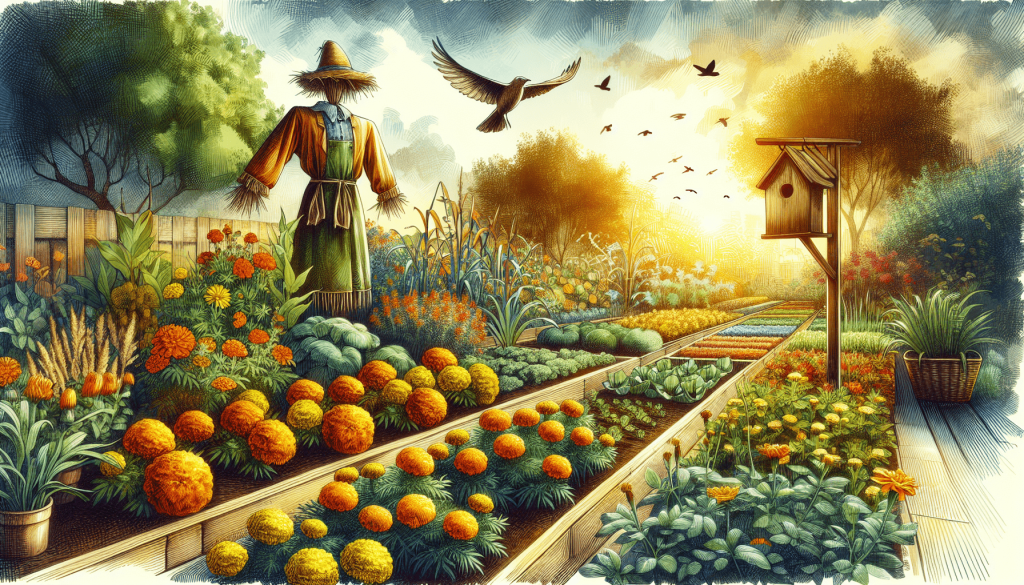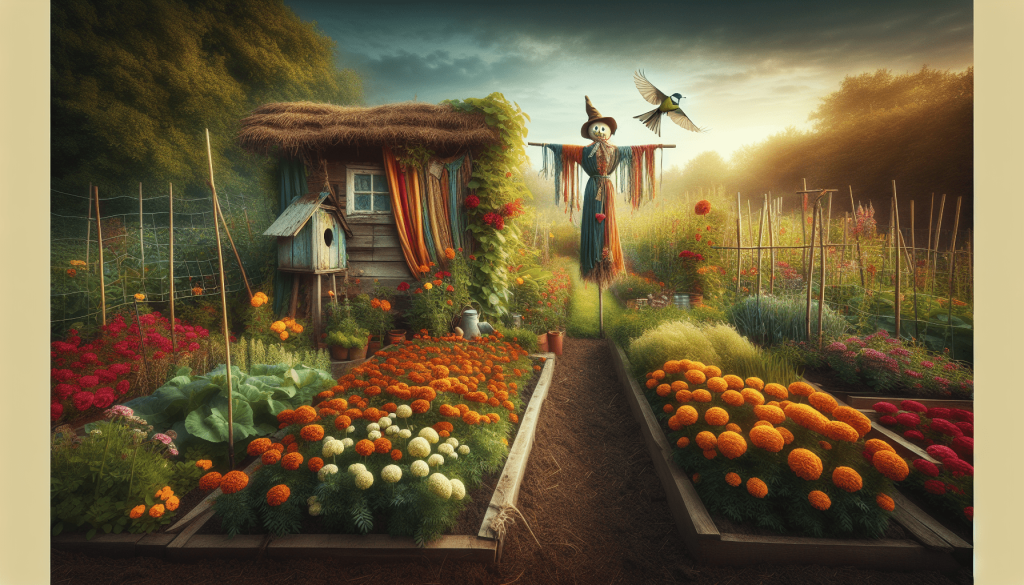This post may contain affiliate links. As an Amazon Associate, we may earn commissions from qualifying purchases.
If you’ve been noticing some unwelcome visitors in your garden, you’re probably looking for safe and effective ways to keep pests at bay without resorting to harsh chemicals. Protecting your green space naturally is not only better for the environment but can also keep your plants healthier in the long run. From introducing beneficial insects to experimenting with companion planting, the options are both fascinating and surprisingly simple. By taking a closer look, you’ll discover various environmentally friendly strategies to maintain a thriving garden by deterring pests naturally, ensuring your outdoor sanctuary remains both lush and vibrant.
What Are The Most Effective Ways To Deter Garden Pests Without Chemicals?
Have you ever strolled through your garden and noticed that your plants are not quite as vibrant as they once were, possibly because of unwanted visitors? Using chemicals to deal with garden pests is a common approach, but are you seeking more natural, eco-friendly solutions? Fear not, there are numerous ways to protect your precious plants from pests without reaching for harmful chemicals. Let’s explore some effective methods to keep your garden thriving and free from pests, naturally.

Understand Your Enemy: Common Garden Pests
Before devising any plan, it’s essential to know what you’re dealing with. Common garden pests include aphids, slugs, snails, caterpillars, and beetles. Each pest has its preferences and weaknesses, which can be tactically used against them.
Aphids
Small and mighty, aphids can cause significant damage by sucking the sap from your plants, which can lead to distorted leaves and stunted growth.
Slugs and Snails
These slimy creatures love moist, shaded areas and can devour entire plants overnight. They are especially fond of young, tender plants.
Caterpillars
Though they turn into beautiful butterflies or moths, caterpillars can be voracious eaters during their larval stage, chewing through leaves, flowers, and fruits.
Beetles
From the Japanese beetle to the cucumber beetle, these pests can chew through leaves, flowers, and fruits, leaving behind a trail of destruction.
Natural Deterrents and Remedies
Understanding the pest is step one; now, how do you naturally keep them at bay?
Physical Barriers
Creating physical barriers can effectively block pests from getting to your plants.
Row Covers
Lightweight fabric covers can protect plants from pest invasions while still allowing light and water to penetrate. They are particularly useful for young plants.
Copper Tape
Slugs and snails detest copper because it produces a slight electric shock upon contact. Lining your pots and raised beds with copper tape can keep these pests away.
Diatomaceous Earth
This natural powder is made from the fossilized remains of tiny aquatic organisms called diatoms. Sprinkle it around your plants, and it will deter soft-bodied pests like slugs and aphids.
Plant Companions
Some plants can repel pests naturally due to their strong scents or specific chemicals they emit.
Marigolds
The bright and cheerful marigold is known to repel a range of pests, including aphids and beetles, thanks to its pungent smell.
Garlic
Planting garlic around your garden can deter aphids, slugs, and even rabbits due to its strong odor.
Basil
Basil not only adds flavor to your dishes but also repels thrips, flies, and mosquitoes.
Natural Sprays and Solutions
Sometimes, a more direct approach is necessary. Here’s how you can create effective pest deterrents from everyday ingredients.
Neem Oil
Derived from the seeds of the neem tree, neem oil is a powerhouse against pests. It’s effective against aphids, mites, and many fungi.
Soap Sprays
Mixing a small amount of mild, biodegradable soap with water and spraying it on infested areas can help control pests like aphids and mites by breaking down their protective layers.
Chili Pepper Spray
Mix chili powder or hot pepper flakes with water and a drop of dish soap to create a spicy spray that can deter many pests.
Encouraging Natural Predators
One of the most sustainable and long-term solutions for pest control is to promote a healthy ecosystem in your garden that encourages natural predators.
Birds
Birds can be significant allies in controlling pests. Installing a bird feeder or a birdbath can attract birds, who will in turn feast on troublesome insects.
Ladybugs
Ladybugs are natural predators of aphids and other harmful insects. You can buy ladybugs from garden centers or online to release in your garden.
Praying Mantises
Though they look intimidating, praying mantises are beneficial as they consume a vast amount of harmful pests. Like ladybugs, they can also be purchased and introduced into your garden.
Regular Maintenance and Monitoring
The most overlooked yet simplest method is regular garden maintenance.
Clear Out Debris
Regularly clearing your garden of fallen leaves and dead plants will reduce hiding spots and breeding grounds for pests.
Monitor Regularly
Regularly check your plants for signs of pests. Early detection can prevent a full-blown infestation.
Water Appropriately
Overwatering can lead to root diseases and mold formation, while underwatering can stress plants, making them more susceptible to pests. Maintain a balanced watering schedule.

Creating a Healthier Garden Environment
Finally, ensuring your garden is healthy is the key to preventing pest invasions.
Healthy Soil
Invest in building healthy soil. Nutrient-rich, well-draining soil supports robust plant growth, making them naturally more pest-resistant.
Rotate Crops
Rotating crops each year can prevent soil depletion and reduce pest build-up that occurs when the same plants are grown in the same place repeatedly.
In conclusion, combating garden pests without using chemicals requires a mixture of knowledge, strategy, and proactive gardening practices. By understanding the pests, employing natural deterrents, encouraging beneficial predators, and keeping your garden healthy, you can enjoy a vibrant, thriving garden that is both productive and pest-free. Remember, the aim is not to eradicate all insects but to create a balanced ecosystem where pests and plants can coexist without significant harm.








